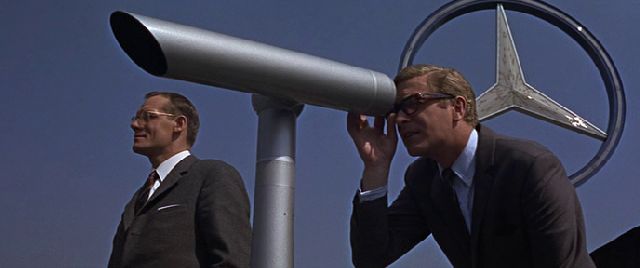Funeral in Berlin (1966) 
“It was going to be a lovely funeral. Harry Palmer just hoped it wouldn’t be his…”

Director: Guy Hamilton
Cast: Michael Caine, Oskar Homolka, Paul Hubschmid
Synopsis: A British agent is sent to Berlin to receive a Communist defector, but the true situation turns out to be rather more complicated.
It’s not often that you can pinpoint the exact moment in which a previously fairly straightforward movie suddenly assumes the labyrinthine proportions of a near-insoluble puzzle, but you can in Funeral in Berlin, Guy Hamilton’s sequel to the hugely successful The Ipcress File. It arrives when four men unscrew the lid of a coffin to discover that, instead of containing the living man they expected, it contains the corpse of another man entirely. From that moment on, triple-cross follows double-cross in a dizzying succession of plot twists that will leave many inattentive viewers totally clueless as to what is going on. Even some of those paying close attention will end up scratching their heads. But then that’s the fun of 1960s Cold War spy thrillers…
Funeral in Berlin, the second of three 1960s Harry Palmer movies (the series was briefly — and ill-advisedly — revived in the mid-1990s for a couple of TV movies), sees our cockney anti-hero (Michael Caine — Zulu, The Dark Knight) being despatched to Berlin by his surly boss, Ross (Guy Doleman — On the Beach, The Deadly Bees) to look into the reliability of overtures made by a high-ranking Russian official (Oscar Homolka — Billion Dollar Brain, Assignment to Kill) claiming a desire to defect to the West. Upon meeting General Stok, Palmer isn’t convinced, but Ross is keen to bring him over, so he has no option but to go ahead and oversee arrangements. One of Stok’s conditions is that his escape to the West is carried out by a man called Kreutzman (Gunter Meisner — The Boys from Brazil), and in order to make contact with this elusive criminal, Palmer relies upon his contact in Germany, Johnny Vulkan (Paul Hubschmid) to arrange a rendezvous.
While Johnny’s doing that, Harry’s busy being seduced by a lush young thing called Samantha Steel (Eva Renzi) who wastes no time in inviting him into her bed. Pleased as Harry is by this unexpected turn of events, he’s under no illusions about his pulling power and hires a professional burglar and safe-man to break into Samantha’s apartment and find out her real motive for bedding him. It turns out she’s an agent for Mossad, and is on the hunt for £2,000,000 owed to Holocaust Jews by a mysterious character named Paul Louis Broom — which just happens to be the name on the ID papers provided by MI5 in compliance with one of Kreutzman’s terms for smuggling Palmer’s man — the identity of whom Palmer refuses to reveal — across the border to West Berlin. The plot, as they say, thickens…
Michael Caine’s British Agent was the dreary antithesis of Sean Connery’s. While 007 jetted across the world, Palmer traversed London on a red bus. Bond accepted the lustful attentions of beautiful women as a perk of the job, whereas when a good-looking woman gives Harry the nod he immediately smells a rat. And Bond killed without conscience, while Palmer will do anything to avoid killing another person. With Bond, the whole story was played out on the screen in front of you, while with Palmer all the action takes place under the surface while nothing much happens on the screen. And Palmer observes all of the underhand manoeuvrings of the various players in his game with a laconic cynicism that tells us he knows exactly just how seedy the circles in which he’s forced to move really are. It’s Len Deighton’s hero who strips away the glamour to reveal just how isolating the life of a secret agent must really be.
Caine, as always, is excellent as Palmer, the epitome of black-rimmed cool in an age when real men never owned up to defective eyesight, and he brings just the right level of subdued motivation to the part of a man resigned to a life he doesn’t want but from which he can’t escape. Doleman as his ill-tempered boss provides a worthy foil, and Oskar Homolka is a lot of fun as the Russian general (his character was popular enough to earn a return visit in Billion Dollar Brain the following year), but neither of them receives the amount of screen time they deserve. Much of the movie was filmed in West Berlin, giving a welcome, gritty feel to the proceedings that anchors the story in a definite era of post-Bond realism. It’s not all doom and gloom, however, and Evan Jones’ intelligent script isn’t short of moments of humour. Hamilton follows Jones’ lead with a wickedly funny sight gag in which Palmer strolls past a number of phallic stone bollards each morning after he has spent the night with the accommodating Ms. Steel. Overall, though, the tone is one of weary cynicism and fatalism that provides challenging entertainment as it paints a grey picture of those paid to protect us.
(Reviewed 1st May 2014)
httpv://www.youtube.com/watch?v=1AHOUwBdsKs
